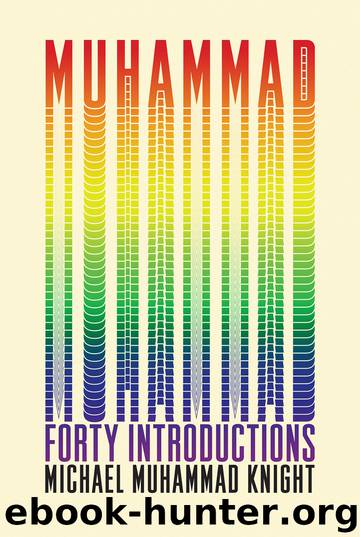Muhammad by Michael Muhammad Knight

Author:Michael Muhammad Knight
Language: eng
Format: epub
ISBN: 9781593761677
Publisher: Soft Skull Press
Published: 2018-10-24T16:00:00+00:00
25
MOTHER OF THE BELIEVERS
A’isha narrated:
I wish that when I die, I am completely forgotten.121
These words come from Ibn Abi Shayba’s Musannaf and represent a narration from later in A’isha’s life, decades after the deaths of her husband and father. She speaks as an old woman living near their graves but far from the new center of power, rehabilitating her social position as a teacher of the Qur’an and the law, a custodian of sacred memory for younger generations. She remembers her failed revolution, for which she will be blamed and which will be used for centures as proof that women are impulsive, irrational, and destructive. She has retired from a life of political resistance, but the turmoil continues without her. In another narration from the same section of the Musannaf, she tells us, “I wish that I was a leaf from this tree.”122
Examining A’isha’s wish to be “completely forgotten,” Nadia Maria El Cheikh has observed something remarkable in A’isha’s precise wording, nasyan mansiyan: with this lament, A’isha perfectly repeats the Virgin Mary’s words as they appear in the Qur’an. Clinging to the trunk of a palm tree during the pains of her labor, Mary cries, “I wish that I had died before this and that I was completely forgotten” (19:23). El Cheikh reminds us that both Mary and A’isha were falsely accused of sexual misconduct.123 When given word of her miraculous pregnancy, Mary pleads to the angel, “I am not a whore”; as a sectarian mascot and polemical target generations after her death, A’isha would also undergo branding as a “whore” by her critics.124 Analyzing the story of Mary as an example of “subversive births” in the Qur’an, Aisha Geissinger notes that in the nineteenth sura, Mary appears “strikingly . . . painfully alone and outcast.”125 A’isha maintains a circle of students in Medina and tells stories of the Prophet to her nephew ‘Urwa, but also feels alone and lost, a childless old widow and defeated dissident living under house arrest. A’isha appears to have located her own experience as an echo of the Qur’an’s portrayal of Mary as an unjustly scandalized woman, forced by her unwanted role in the fulfillment of the divine plan to withdraw from society and endure her pain alone.
Rather than engage the Sunni-Shi’i schism only as a power struggle in which ‘Ali and Abu Bakr become the central contestants, I find it helpful to present the early community’s divisions in terms of competing gendered triangles. This borrows from queer theory scholar Eve Sedgwick’s notion of triangulation, which calls attention to the role of women’s bodies in mediating relationships between men.126 Once you start looking for triangulation, you see it everywhere, repeated in countless movies in which an adventuring group of friends includes two men and one woman. The two men are closely bonded, and in turn bonded to the woman: one is her sexual partner, the other her family, a literal or figurative brother. Perhaps the paradigmatic example appears in the original Star Wars trilogy’s
Download
This site does not store any files on its server. We only index and link to content provided by other sites. Please contact the content providers to delete copyright contents if any and email us, we'll remove relevant links or contents immediately.
The History of Jihad: From Muhammad to ISIS by Spencer Robert(2628)
Nine Parts of Desire by Geraldine Brooks(2369)
The Turkish Psychedelic Explosion by Daniel Spicer(2356)
The First Muslim The Story of Muhammad by Lesley Hazleton(2271)
The Essential Rumi by Coleman Barks(2046)
1453 by Roger Crowley(2030)
The Last Mughal by William Dalrymple(1857)
Trickster Travels: A Sixteenth-Century Muslim Between Worlds by Davis Natalie Zemon(1847)
Muhammad: His Life Based on the Earliest Sources by Martin Lings(1646)
God by Aslan Reza(1642)
by Christianity & Islam(1632)
A Concise History of Sunnis and Shi'is by John McHugo(1567)
No God But God by Reza Aslan(1545)
Magic and Divination in Early Islam by Emilie Savage-Smith;(1534)
The Flight of the Intellectuals by Berman Paul(1503)
Nothing to Envy by Barbara Demick(1450)
Art of Betrayal by Gordon Corera(1430)
What the Qur'an Meant by Garry Wills(1394)
Getting Jesus Right: How Muslims Get Jesus and Islam Wrong by James A Beverley & Craig A Evans(1342)
